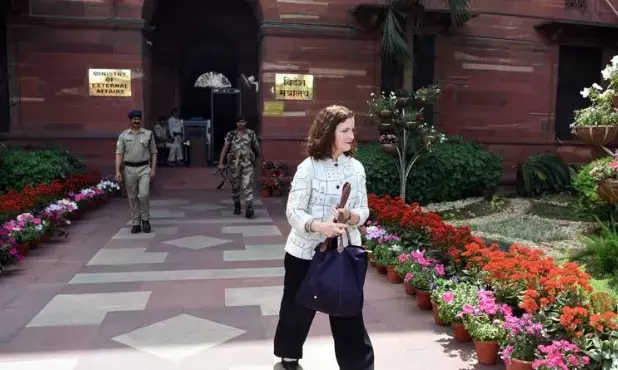Kejriwal’s Arrest : US & India Spat
UN raises issue of rights

It is fairly unprecedented for major countries and supposed allies like the United States and Germany to note and comment upon the arrest of Delhi Chief Minister Arvind Kejriwal by raising the issue of rights and the need for fair and free elections. And this makes it even more serious when the United Nations follows up with similar concerns, and expresses the hope that “in India, as in any country that is having elections, that everyone's rights are protected, including political and civil rights, and everyone is able to vote in an atmosphere that is free and fair.”
The above remarks came from the spokesperson for the Secretary-General Stephane Dujarric while responding to a specific question on “political unrest” in India following Kejriwal’s arrest by the Enforcement Directorate and the freezing of the Congress party accounts.
India has been valiantly fighting what it clearly sees as a diplomatic offensive, with the Ministry of External Affairs summoning the German deputy chief of mission Georg Enzweiler and then just a few days later senior US diplomat Gloria Berbena. InInterestingly, this is the third time that New Delhi and Washington have exchanged words in less than a month. And this has raised diplomatic eyebrows given both countries avowed commitment to each other.
The US State Department has raised issues that New Delhi is extremely sensitive to. Just over a couple of weeks ago the US state Department spokesperson Matthew Miller said, “we are concerned about the notification of the Citizenship (Amendment) act on March 11.” The Indian Foreign Office immediately rejected the remarks as “misplaced, misinformed, and unwarranted.”
The State Department came back with “we encourage a fair, transparent and timely legal process for Chief Minister Kejriwal.” The Ministry of External Affairs summoned a senior US diplomat in response to lodge its protest against this “unwarranted” interference in India’s internal affairs.
These exchanges could have been termed routine but what has pulled these out into the spotlights is the fact that the Indian protest and refutation has not silenced the US State Department. When asked about the senior diplomat being summoned, Miller not just reiterated his administration’s stand on Kejriwal but also added the freezing of the Congress party funds in good measure. “We continue to follow these actions closely, including the arrest of Delhi CM Arvind Kejriwal. We are also aware of the Congress party’s allegations that tax authorities have frozen some of their bank accounts in a manner that will make it challenging to effectively campaign in the upcoming elections. And we encourage fair, transparent and timely legal processes for each of these issues,” spokesperson Miller said.
These strong words by Washington, backed by Germany and the UN, are in all probability being taken seriously by New Delhi as it works the phones and the diplomatic channels to turn the heat off. However, the second follow through by the US State Department and the castigation from the UN Secretary General’s office despite strong Indian protest indicates that the world is watching the Indian elections closely, particularly what it views as attempts to thwart the democratic process. The West in particular seems to be placing itself on a high horse, judging the election process in India, and while praising democracy at every turn in bilateral and global relations, is now prepared to even raise ‘internal issues’ such as the arrest of the Chief Minister. The support by the US State Department for the Congress insofar as the freezing of its funds is concerned is of diplomatic significance, as the statements are intended to send out a clear message that the world is watching India every step of the way.
The Ministry of External Affairs has no option other than to counter these strong statements, but Minister Jaishankar being a career diplomat is probably not very happy with the pre-election diplomatic cacophony. Not just because it indicates the very clear intention to place the Indian elections under global watch, but also because it shakes relations at the end of a term where he had spent considerable time and effort building relations with Washington that is clearly in no mood to treat Kejriwal’s arrest as an “internal matter.”
Whether this is indicative of a larger malaise afflicting India-US relations or an isolated exchange remains to be seen. But there can be no doubt that when one country raises actions taken or not taken by another, it is a statement of concern and a message that the world is no longer an island for individual governments to revel in.
.



